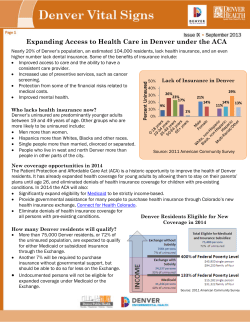
Communicating with Customers about Compliance and Cost
ACA Compliance: Communicating with Customers The Affordable Care Act (ACA) employer mandate is effective January 1, 2015. As a workforce solutions partner, your alternative staffing organization (ASO) should be transparent with customers about how you plan to manage your obligation under the law, and what they can expect regarding pricing and coverage of the employees you place. Following is a summary of language you can adapt as needed to communicate with your customers. The sample language has been sourced from American Staffing Association member firms’ websites and is generally standard across sites. In reviewing the websites, two themes are common: staffing firms assure customers they are ACA-compliant, and they assert their ACA expertise and readiness to help customers understand and manage costs of ACA compliance. Introduction / Discussion of ACA Compliance The Affordable Care Act (ACA) is the most sweeping health care legislation in decades. It aims to give workers greater access to better coverage at more competitive prices, giving them more control over their work life, and increasing the mobility and competitiveness of the U.S. workforce. As you know, beginning January 1, 2015, companies with 100 or more full-time or full-time equivalent employees must comply with the employer provisions of the law. As a large employer, [Name of ASO] is committed to ACA compliance – both in letter and in spirit – and to our temporary employees. We are also dedicated to using our expertise to help clients navigate the complexities of the law and to understand the nature and extent of additional staffing costs generated by this legislation. While implementing the ACA presents challenges to our industry, [Name of ASO] is committed to compliance with the law. We are dedicated to the legal and ethical management of our workers. We will therefore work diligently to help our clients implement legitimate workforce strategies and will not participate in practices that violate the law’s intent. We look forward to learning about any questions you may have regarding the ACA and how we may continue to be of assistance as your trusted workforce solutions partner. Discussion of ACA cost increases if your ASO is offering insurance: The Affordable Care Act (ACA) is the most sweeping health care legislation in decades. As you know, on January 1, 2015 the ACA Employer Mandate provision will require large employers (for 2015, those with 100 or more full-time equivalent employees) to provide insurance for their workforce or pay penalties. [Name of ASO] has decided that we will provide insurance plans to our eligible temporary employees to comply with the employer provisions of the law. Alternatively: The ACA Employer Mandate goes into effect on January 1, 2015 and [Name of ASO] and all employers with 100 or more employees will need to offer insurance to employees or pay penalties. This is commonly referred to as “Pay or Play.” [Name of ASO] has made a decision to provide insurance. [Name of ASO], like all reputable staffing companies, will need to pass these costs on to clients through price increases in 2015. Our estimates project that during the first year of the Employer Mandate, we will incur significant costs both in the insurance policy costs and the administration of the benefits program to our employees. The cost is difficult to forecast, as the level of participation is unknown, but based on the costs we are currently projecting, we anticipate an X% increase in our direct costs. You might further explain that your direct cost increases are dependent on: - The percentage of your workforce that are eligible for benefits The percent of eligible employees you estimate will take the insurance offered The costs of insurance they are being offered Eligible employees’ pay rate and your corresponding contribution to ensure affordability Discussion of ACA cost increases if your ASO is not offering insurance: As a large employer, [Name of ASO] must be compliant with the new law. For us and many other staffing providers, the types of healthcare benefit packages typically available to employers in the staffing industry will no longer meet the new federal standards for "minimum essential coverage." In lieu of offering coverage, we have made the decision to pay the Employer Shared Responsibility payment of $2,000 per year ($167 per month) per full-time employee. As a practical matter, this is a mandatory payroll tax not unlike other statutory costs which include FICA, FUTA, SUTA, and Workers Compensation insurance. Reminder: For 2015, your actual Employer Shared Responsibility payment is equal to the number of full-time employees you employed each month – minus 80 – multiplied by 1/12 of $2,000, provided that at least one full-time employee receives a premium tax credit for that month. Response to question, “Can I avoid the price increase if I limit the total hours for my temporary employees?” No, the employees you use during the year will likely be reassigned elsewhere, and thus will continue to be considered full‐time, triggering our obligation to provide insurance. Thus, we need to pass along price increases to all our clients across the board. General Staffing Industry Information In 2014, the American Staffing Association commissioned a study by Towers Watson to provide insight into staffing companies’ ACA compliance strategies. According to the Towers Watson study, 54% of staffing companies will be offering affordable ACA level plans to eligible temporary and contract workers. The remaining 46% are either planning to pay penalties or are too small to be covered during the transition year. The 2014 Staffing World meeting confirmed that the majority of staffing firms in the U.S. will apply their additional ACA Employer Mandate costs across their entire workforce, and subsequently, across their entire client base. While staffing firms know how many employees are eligible for health insurance, there is uncertainty about the percentage of employees that will choose to enroll in the plans offered. ACA Employer Mandate Effective, January 1, 2015, Applicable Large Employers can either: (a) Pay the costs for meeting the following requirements, often called the “play” option: 1. Offer “minimum acceptable” healthcare insurance to at least 70% of their eligible full-time employees (increases to 95% in 2016) 2. Ensure that the cost of the plan they offer is “affordable,” i.e., will not require any employee to pay more than 9.5% of their annual pay towards the costs of an individual plan, and 3. Ensure that the plan(s) offered and the employer’s contribution to these plans is not set up to favorably treat highly compensated employees, OR (b) Pay a charge of $2,000/year ($167/month) per full-time employee, excluding the first 80 full-time employees (decreases to 30 in 2016), often called the “pay” option.
© Copyright 2025













